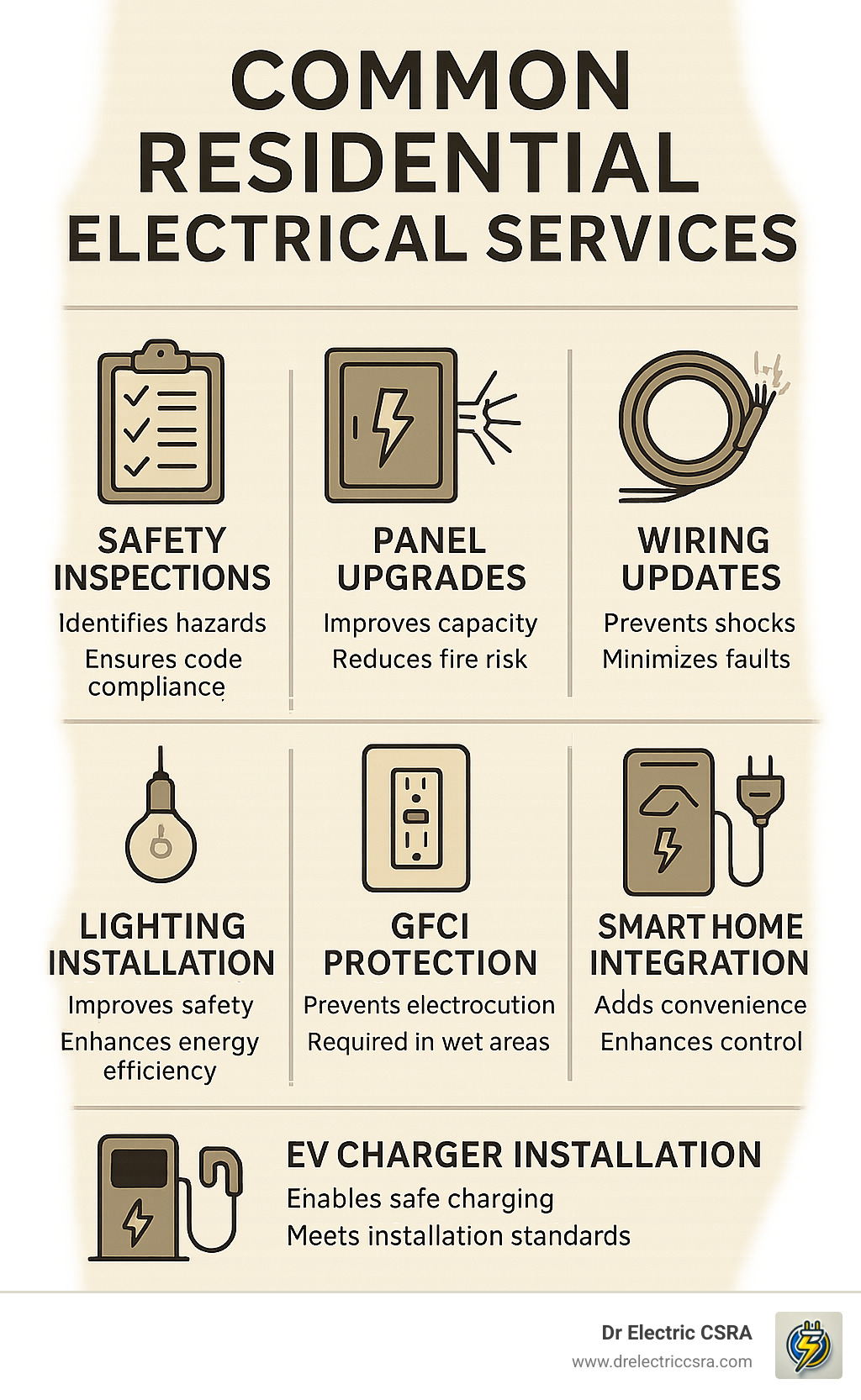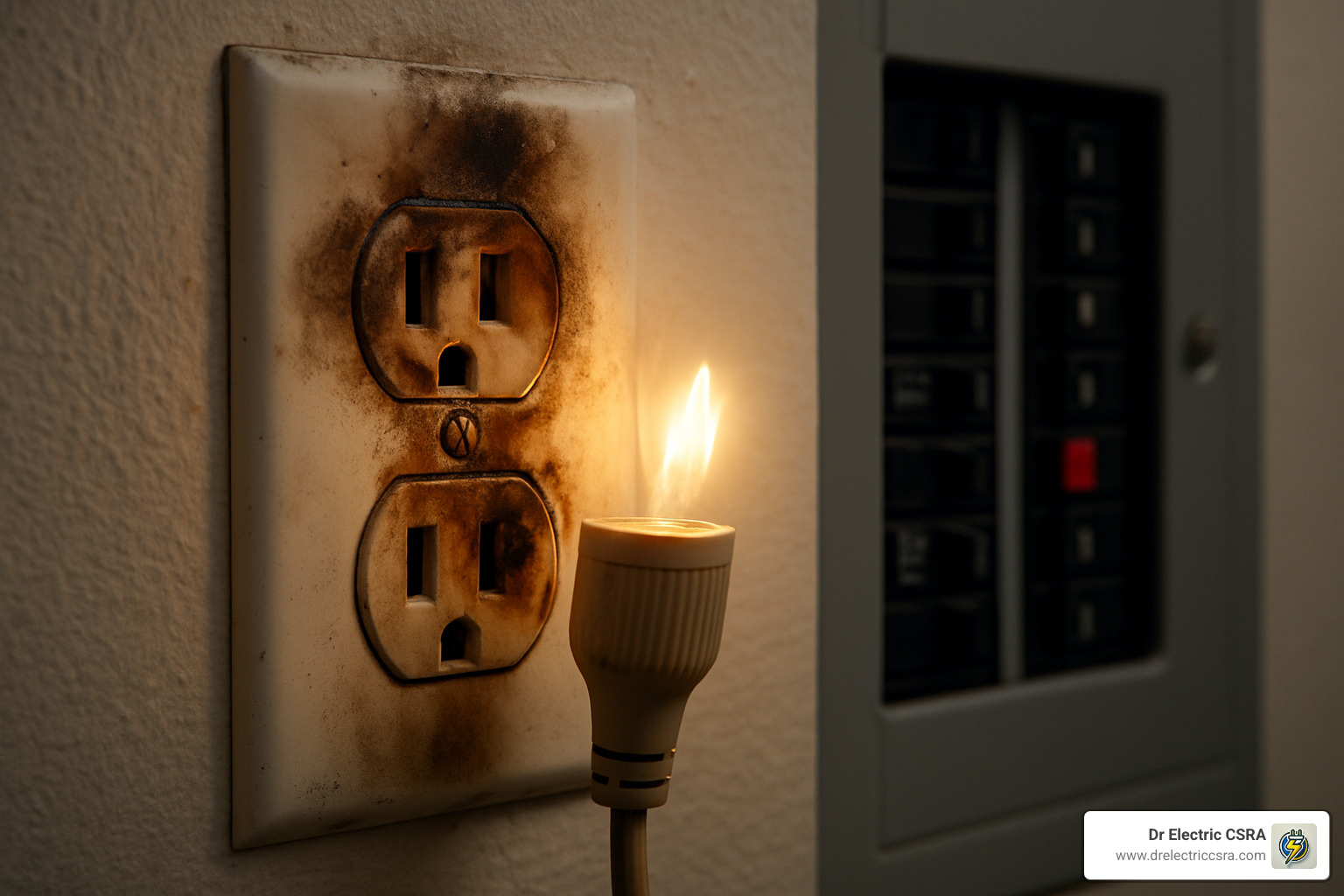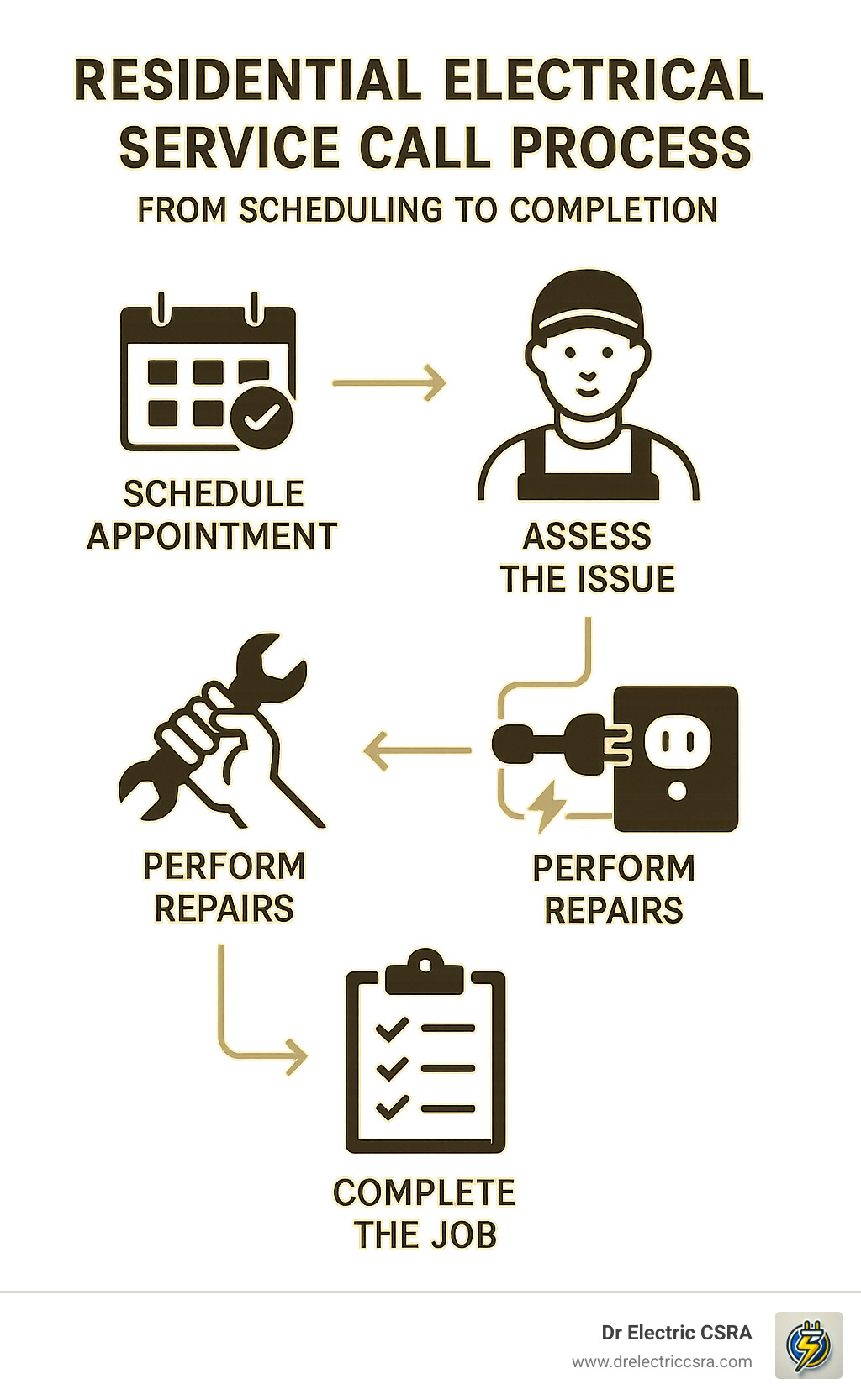When Your Home’s Power Is at Stake: Understanding Residential Electrical Services
Residential electrical services are professional installations, repairs, and maintenance of your home’s electrical systems performed by licensed electricians to ensure safety and functionality. These services help prevent electrical fires, shocks, and equipment damage while maintaining code compliance.
Here are the most common residential electrical services homeowners need:
| Service Type | What It Includes | When You Need It |
|---|---|---|
| Safety Inspections | Comprehensive evaluation of wiring, panels, outlets | When buying a home, after 10+ years, or if experiencing issues |
| Panel Upgrades | Replacing outdated electrical panels | When breakers frequently trip, for homes 25+ years old |
| Wiring Updates | Replacing knob-and-tube or aluminum wiring | For homes built before 1970, insurance requirements |
| Lighting Installation | Interior and exterior fixture installation | Home renovations, energy efficiency upgrades |
| GFCI/AFCI Protection | Installing specialized safety outlets | Required by code in kitchens, bathrooms, outdoors |
| Smart Home Integration | Wiring for automation systems | When upgrading to connected devices |
| EV Charger Installation | Dedicated circuit for vehicle charging | When purchasing an electric vehicle |
Electrical faults cause approximately 51,000 home fires annually in the United States, resulting in nearly 500 deaths and $1.3 billion in property damage. Most of these incidents are preventable with proper installation and maintenance by qualified professionals.
As a homeowner, you may take your electrical system for granted—until something goes wrong. When lights flicker, outlets feel warm, or breakers trip repeatedly, these are warning signs that shouldn’t be ignored. Modern homes require more power than ever before, with the average household using far more electronic devices than homes built even 20 years ago were designed to handle.
I’m Jesse Burnett, a Master Electrician with over 1,200 completed residential electrical services under my belt, specializing in everything from panel upgrades to smart home conversions and EV charging stations for residential electrical services clients throughout the Central Savannah River Area.

Electrical services residential terms you need:
Electrical Services Residential: The Backbone of a Safe Home
Think about what makes your home truly safe and comfortable. While you might first consider your locks or smoke detectors, your home’s electrical services residential system is silently powering everything that matters—from your refrigerator keeping food fresh to the CPAP machine helping grandpa sleep at night.
Every three years, the National Electrical Code (NEC) gets updated with new safety standards. This regular refresh isn’t just bureaucratic paperwork—it reflects how quickly technology changes and how our homes need more power than ever before. Many Augusta and Evans homeowners we’ve worked with are surprised to learn their homes don’t meet these current standards.
Michael Thompson from Martinez shared his eye-opening experience: “When I bought my 1970s home, I had no idea the electrical system was so outdated. The inspector pointed out aluminum wiring that my insurance company flat-out refused to cover without an upgrade. That’s when I realized how important proper electrical services residential really are.”
Safety goes far beyond just preventing the obvious electrical fires. It’s about:
Creating a complete shield of protection through proper grounding to prevent shocks
Ensuring your electrical panel can handle your family’s power needs without constant breaker trips
Protecting expensive electronics from sudden power surges that can fry circuits
Maintaining reliable power for the systems you can’t afford to lose—like security cameras or medical devices
More info about safety inspections
What “electrical services residential” really means
Most homeowners hear electrical services residential and picture someone fixing a broken outlet. In reality, it’s so much more—it’s a comprehensive approach to your home’s electrical health.
At its heart, residential electrical services include everything from the first wire installed in a new home to the emergency repairs when storms knock out power. It covers installations of new fixtures, regular maintenance checks, repairs when things break, upgrades when technology changes, and emergency services when you need help fast.
Each category contains dozens of specific services. For example, we regularly install new electrical panels, wire dedicated circuits for major appliances, set up whole-house surge protection systems, and install those special GFCI outlets that protect you from shock in wet areas.
Our lead technician often tells customers: “Those little plastic power strips from the big box store aren’t real surge protectors. A whole-house surge protection system installed directly at your electrical panel is like having an invisible shield around every electronic device in your home.”
Electrical Services Residential & Modern Living
The connection between electrical services residential and modern living grows stronger every year. Today’s homes aren’t just places to eat and sleep—they’re technological hubs requiring specialized electrical infrastructure:

The smart home industry has exploded to a whopping $40 billion market, with most Americans owning at least one smart device. These gadgets need stable power and often specialized wiring to work properly.
Electric vehicles aren’t just for early adopters anymore. More families are installing home charging stations, which require dedicated 240V circuits—similar to what powers your dryer—and careful calculations to ensure your home can handle the additional load.
Those old energy-hungry light bulbs are disappearing as LED retrofits can slash your lighting energy use by 75%. Sometimes these upgrades require electrical modifications to work with newer technology.
And with more people working from home than ever before, dedicated office circuits have become essential to support computers, printers, and video conferencing equipment without overloading existing wiring.
An Augusta homeowner recently told us after completing a smart home upgrade: “I never realized how outdated my home’s electrical system was until I tried to install smart switches. My electrician explained that my old wiring couldn’t support the neutral wire these devices need. The upgrade was necessary but has completely transformed how we interact with our home.”
worth an estimated $40 billion
15 Essential Home Electrical Services & Upgrades
Your home’s electrical system powers everything from essential appliances to entertainment devices, making electrical services residential upgrades a worthy investment. Modern homes demand more power than ever before, and the right electrical improvements can transform both safety and comfort.
Let me walk you through the 15 most valuable electrical services that Augusta homeowners are requesting today:
When John from Evans called us about his flickering kitchen lights, he had no idea it would lead to a complete lighting installation overhaul. “I thought I just had a bad bulb,” he told us. “Turns out my 1980s wiring couldn’t handle our new appliances.” Electrical panel upgrades like John’s are increasingly common as homes age and our power needs grow.
Sarah in Martinez finded the importance of whole-house rewiring during a routine inspection. “The inspector found aluminum wiring that my insurance wouldn’t cover without replacement. It was scary to learn my family had been at risk,” she shared.
On hot Georgia summer days, nothing beats the comfort of properly installed ceiling fans. They circulate air effectively while reducing your cooling costs – a win-win for comfort and efficiency.
Landscape lighting does more than just make your home look beautiful at night. It creates safe pathways and deters potential intruders, combining aesthetics with practical security benefits.
With electric vehicles becoming mainstream, EV charger installation has become one of our fastest-growing services. “Having my own charging station means I never worry about finding a public charger,” explains Michael from Augusta, who recently had a Level 2 charger installed in his garage.
After last year’s ice storm, requests for whole-house generators skyrocketed. “Those three days without power with two small children convinced us we needed a backup plan,” one Grovetown family told us after their generator installation.
Surge protection systems are like insurance for your expensive electronics. One lightning strike can destroy thousands of dollars in appliances and devices without proper whole-house protection.
The interconnected smoke and CO detector installation we completed for the Williamson family potentially saved lives when their furnace malfunctioned last winter. Modern, hardwired systems provide protection even during power outages.
Dedicated circuits for major appliances prevent the frustration of tripped breakers. “Before you installed separate circuits for our kitchen, we couldn’t run the microwave and coffee maker at the same time,” laughed one customer.
Smart home technology has made smart switch and outlet installation increasingly popular. These devices allow you to control lighting and appliances remotely while monitoring energy usage.
Georgia’s hot attics can reach temperatures of 150°F in summer. Attic fan installation helps regulate temperature, protect your roof, and reduce cooling costs significantly.
For homeowners with pools, proper pool and spa wiring isn’t just about convenience—it’s about safety. Electrical faults near water can be deadly, making professional installation essential.
Work-from-home arrangements have increased demand for data and communication cabling to support reliable internet throughout the house. “My Zoom calls stopped freezing once you installed proper ethernet wiring,” reported one grateful home-office worker.
Perhaps most important are comprehensive safety inspections that identify potential hazards before they cause problems. These detailed evaluations often reveal issues homeowners would never spot themselves.
Lighting & Ambiance Boosters
Lighting transforms both the function and feeling of your home. Electrical services residential projects focused on lighting deliver some of the most visible and appreciated improvements.
LED conversion remains our most requested lighting service. When the Johnsons in Augusta converted their entire home from incandescent bulbs to LEDs, they saw their lighting energy use drop by nearly 70%. “The light quality is better, and we’re saving money every month,” Mrs. Johnson told us.
Recessed lighting creates clean, modern illumination without visible fixtures cluttering your ceiling. As one customer noted after her kitchen renovation, “The recessed lights make my space look bigger and brighter without hanging fixtures getting in the way.”
The simple addition of dimmer switches gives you remarkable control over your home’s atmosphere. Movie night, romantic dinner, or bright task lighting—one switch handles it all while extending bulb life and saving energy.
Motion sensor lights have become increasingly popular in bathrooms, laundry rooms, and garages. “With my hands full of groceries, I love that my garage lights turn on automatically,” shared Robert from Martinez.
Security flood lighting around your property’s perimeter provides peace of mind. Motion-activated floods deter potential intruders while providing safe passage for family members arriving home after dark.
Power & Protection Upgrades
The foundation of your home’s electrical system deserves special attention. These critical upgrades ensure safety and reliability for everything else in your home.
Panel capacity upgrades have become essential as homes add more devices and appliances. Many older Augusta homes still have 100-amp service or less, but modern demands often require 200-amp service. “We kept tripping breakers until Dr Electric upgraded our panel,” explained one Evans homeowner. “Now we can run the air conditioner and cook dinner without thinking about it.”
Sub-panel installation solves specific area problems without a complete system overhaul. When David built his workshop in the backyard, adding a sub-panel allowed him to power multiple tools safely without running new lines to the main house panel.
Georgia’s unpredictable weather makes generator installation a wise investment. Whether you choose a whole-house system or one that powers essential circuits, having backup power during outages provides incredible peace of mind.
Surge protection devices installed at your main panel provide whole-house protection against power spikes that can damage expensive electronics. “After lightning struck near our home and fried our TV and computer, we had whole-house surge protection installed immediately,” one Augusta family shared.
Electrical grounding improvements might not be visible, but they’re vital for safety. Proper grounding ensures dangerous fault currents have a path to ground instead of through people or property.
Whole House Generators Prices Installed
Comfort & Convenience Installs
Modern electrical services residential projects increasingly focus on enhancing everyday comfort and convenience.
Ceiling fans remain one of our most requested installations, especially in Georgia’s climate. Beyond cooling benefits in summer, properly installed ceiling fans can actually help distribute warm air in winter when reversed. “Our ceiling fans made an immediate difference in comfort,” shared Jennifer from Grovetown. “Plus, they look so much better than the dated light fixtures they replaced.”
EV charging stations have moved from luxury to necessity for many homeowners. Level 2 home chargers provide 5-10 times faster charging than standard outlets, turning overnight charging into just a few hours. “I used to worry about having enough charge for unexpected trips,” said new EV owner Michael. “Now my car is always ready to go.”
Smart thermostats connect to your home’s electrical system to provide precise climate control. The energy savings alone often pay for the installation within the first year or two of use.
USB outlets eliminate adapter clutter by building charging ports directly into your wall outlets. These simple upgrades are particularly popular in kitchens, bedrooms, and home offices where multiple devices need charging.
“I can’t believe how something as simple as adding USB outlets in our kitchen charging station has made life easier,” said Maria from Augusta. “No more searching for adapters or fighting over outlet space.”
How to Know It’s Time to Call a Residential Electrician
Your home’s electrical system works silently in the background—until something goes wrong. Knowing when to call for professional electrical services residential help isn’t just about convenience; it’s about keeping your family safe. Here are the telltale signs that it’s time to pick up the phone and call a pro:

When your lights start doing the “disco flicker,” that’s your home trying to tell you something. Flickering or dimming lights aren’t just annoying—they often signal loose connections or circuits that are struggling to handle your power demands.
Have you ever touched an outlet and noticed it feels warm? That’s never normal. Warm or discolored outlets and switches are like fever symptoms in your electrical system—they indicate excessive heat that could lead to a fire if ignored.
“I kept resetting my breaker every time I ran the microwave and coffee maker together,” shares Augusta homeowner Melissa Chen. “I figured it was just an inconvenience until my electrician explained it was actually my home’s way of preventing an electrical fire. That was my wake-up call.”
When you notice a burning smell coming from an outlet or hear sparking sounds, don’t wait—this requires immediate attention. These aren’t subtle hints; they’re urgent warnings of danger.
Living in an older home in the CSRA region comes with charm and character, but it might also mean you have outdated wiring that doesn’t meet current safety codes. Homes built before 1970 often have knob-and-tube or aluminum wiring that needs professional evaluation.
Planning a kitchen remodel or adding that perfect home office? Any significant renovation should include an electrical system check. Your exciting new space deserves safe, adequate power.
When purchasing a home, especially in established neighborhoods like Hill, Summerville, or West Augusta, a thorough electrical inspection could save you thousands in unexpected repairs down the road.
Finally, if you’ve noticed your power needs growing—perhaps you’ve added new appliances, a home theater system, or are now working from home—your electrical system might need updating to handle the increased demand.
Electrical Services Residential Red-Flag Checklist
Some electrical issues are more than just inconveniences—they’re red flags that demand immediate professional attention.
Frequent breaker trips aren’t just annoying interruptions; they’re your electrical system’s cry for help. When your breaker trips repeatedly, it’s telling you that your electrical demand exceeds what your system can safely handle.
If your home was built between 1965 and 1973, you might have aluminum wiring. While it seemed like a good idea at the time (copper was expensive!), we now know these connections can loosen over time and create serious fire hazards.
The vintage charm of knob-and-tube wiring in pre-1950s homes comes with a major drawback: it lacks proper grounding and wasn’t designed for today’s electrical demands. Your grandmother’s house might have managed fine with a radio and a few lamps, but your modern gadgets need modern wiring.
“During a routine inspection in a Forest Hills home, I finded the previous owner had removed all the GFCI outlets because ‘they kept tripping,'” recalls one of our Dr Electric technicians. “That’s like disconnecting your smoke detector because the alarm bothers you—those trips were preventing potential electrocutions.”
Missing GFCI protection in wet areas like bathrooms, kitchens, and outdoor spaces leaves you vulnerable to shock hazards. These specialized outlets cut power when they detect ground faults, potentially saving lives.
When your electrical system starts making buzzing sounds, it’s not just being chatty—electrical systems should operate silently. Buzzing often indicates arcing or loose connections that need immediate attention.
Non-functioning outlets might seem like a minor nuisance, but they often point to broken connections hidden inside your walls. Similarly, evidence of rodent damage to wiring creates dangerous fire hazards as exposed conductors can spark and ignite surrounding materials.
As one of our master electricians often says, “Your electrical system is like the circulatory system of your home—when something doesn’t feel right, it’s best to get it checked out before a minor issue becomes a major problem.”
Hiring a Licensed & Insured Electrician vs DIY: Safety, Cost & Peace of Mind
The decision between calling a pro or grabbing your toolbox for electrical services residential work isn’t just about saving a few bucks—it’s about weighing real risks against real benefits.
Think about it: electricity isn’t exactly forgiving of mistakes. While hanging a picture frame in the wrong spot might leave an extra hole in your wall, electrical missteps can have far more serious consequences.
“I can’t tell you how many times I’ve been called to fix DIY electrical work gone wrong,” says one of our master electricians. “The homeowner thought they’d save $200, but they ended up spending $800 for me to undo the damage and do it right. And they were lucky—some mistakes could have burned their house down.”
| Aspect | Professional Electrician | DIY Approach |
|---|---|---|
| Safety | Trained to work safely with electricity | Risk of shock, fire, or injury |
| Code Compliance | Knows current NEC requirements | May unknowingly violate codes |
| Permits | Handles permit applications | Homeowner responsible for permits |
| Insurance | Work covered by liability insurance | May void homeowner’s insurance |
| Warranty | Typically 1-5 year workmanship warranty | No warranty on self-performed work |
| Long-term Reliability | Proper installation prevents future issues | Improper work may cause ongoing problems |
| Time | Efficient completion with proper tools | Often takes longer, multiple attempts |
| Cost | Higher upfront investment | Lower initial cost but potential for costly repairs later |
When you hire a licensed electrician, you’re not just paying for the physical work. You’re paying for years of training, knowledge of ever-changing electrical codes, proper permits, and the peace of mind that comes with professional insurance coverage.
Sarah from Evans learned this lesson the hard way: “After watching a few YouTube tutorials, I felt confident installing a new light fixture. Two scorched wires and one terrifying spark later, I realized some things are worth paying for. My electrician not only fixed my mistake but also finded my home’s grounding wasn’t up to code—something I never would have known.”
Beyond safety, there’s also the matter of your home insurance. Many policies contain fine print that can void coverage for electrical fires if the work wasn’t performed by a licensed professional. That $150 you saved doing it yourself could end up costing tens of thousands in uncovered damages.
The True Cost of “Cheap” Electrical Services Residential
When it comes to electrical services residential, what looks inexpensive upfront can become extraordinarily costly down the road.
Hidden repair costs are the most common surprise. That $50 DIY outlet replacement might seem like a bargain until you find your wiring is incompatible or you’ve created a short circuit that damages other components.
“The most expensive electrical work is the work that has to be done twice,” our service manager often tells customers. “And unfortunately, fixing improper work usually costs more than having it done right the first time.”
Failed home inspections can derail your home sale or require expensive corrections under time pressure. Nothing dampens the excitement of selling your home quite like a buyer’s inspector finding non-compliant electrical work throughout the house.
Your insurance coverage is another critical consideration. Many homeowners are shocked to find their insurance won’t cover damages resulting from non-permitted electrical work. That small kitchen fire from an improperly wired outlet? You might be paying for those repairs entirely out of pocket.
Downtime and inconvenience add another layer of cost. When electrical problems render portions of your home unusable, the disruption to your daily life has real value. Professional electricians minimize this downtime with efficient, reliable solutions.
Most importantly, safety risks simply can’t be calculated in dollars and cents. A Martinez family recently shared their experience: “We hired a handyman who said he could do electrical work to save money. Months later, our teenage son got a serious shock from a poorly grounded outlet. No amount of money saved is worth putting your family at risk.”
When you consider all these factors, the true value of professional electrical services residential becomes clear. It’s not just about the immediate task—it’s about long-term safety, reliability, and genuine peace of mind.
Choosing the Right Residential Electrical Contractor Near You
Finding the perfect partner for your electrical services residential needs isn’t just about who has the lowest price—it’s about finding someone you can trust with your home’s safety and functionality. After all, this person will be working on systems that could literally cause a fire if installed incorrectly!

When Evans resident Jennifer Williams needed her electrical panel upgraded, she didn’t just pick the cheapest option. “We got quotes from three different companies,” she shares. “We chose the contractor who took the time to explain exactly what work was needed and why. That attention to detail carried through the entire project.”
So what should you look for? Start by verifying credentials—make sure they’re licensed, insured, and bonded in Georgia. This protects you from liability and ensures they meet professional standards. Then check their reviews and references across multiple platforms to see if they consistently deliver quality work.
Electrical problems don’t politely wait for business hours, so confirm they offer 24/7 emergency availability. Nothing’s worse than a power outage at midnight with no help in sight! Also pay attention to their pricing transparency—reputable contractors provide detailed written estimates before starting work, with no surprise fees lurking after the job is done.
Don’t forget to review their warranty offerings. Quality electrical work should come with a solid workmanship guarantee that gives you peace of mind long after they’ve left your home. And pay attention to their communication style during your initial interactions—a contractor who listens carefully and explains clearly during the estimate will likely bring that same professionalism to the actual work.
Some contractors offer preventative maintenance plans that can save you money long-term by catching small issues before they become expensive emergencies. And most reputable professionals will provide a free estimate, giving you a chance to gauge their expertise and approach without obligation.
Questions to Ask Before You Hire
Before you hand over your house keys to an electrician for your electrical services residential project, arm yourself with these important questions:
“Can you provide your license number and proof of insurance?” (And yes, go ahead and verify this information independently!)
Ask them, “How long have you been performing this specific type of electrical work?” Experience with your particular project type matters—installing an EV charger requires different expertise than rewiring an old home.
Find out if they’ll “pull all necessary permits for this project.” Proper permits protect you and ensure work meets local codes. Also ask about their “estimated timeline for completion” so you can plan accordingly.
Don’t forget to ask, “Do you provide a written warranty on your workmanship?” and “Will you use your own employees or subcontractors?” Direct employees often provide more consistent quality than rotating subcontractors.
Practical matters matter too: “What is your clean-up policy after completing the work?” and “How do you handle unexpected issues that arise during the project?” Their answers reveal a lot about their professionalism.
Finally, request “references from similar projects you’ve completed” and clarify “what payment schedule do you require?”
“The right electrician won’t be annoyed by these questions,” notes our operations manager. “They’ll appreciate working with an informed homeowner who values quality work.”
Prep Your Home for Service Day
Want your electrical services residential appointment to go smoothly? A little preparation goes a long way!
First, clear the work area by removing furniture, decorations, and personal items from spaces where work will happen. This protects your belongings and gives the electrician room to work safely and efficiently.
Don’t forget to secure pets in areas away from the work zone. This keeps Fluffy from escaping out an open door or getting underfoot while the electrician is carrying tools.
Make sure your electrical panel is easily accessible—not blocked by holiday decorations or that treadmill you’ve been meaning to use. And if you’re providing any fixtures or specific materials, have them unpacked and ready for installation.
Take a moment to document any concerns or specific questions on a notepad so you don’t forget to mention them. It’s also smart to backup sensitive electronics before electrical work begins, just in case.
Finally, plan for potential power outages during the work. Charge your devices, have some battery-powered lights handy, and maybe even plan a coffee shop visit if you need to work during the service call.
“Customers who prepare for our arrival help us work more efficiently,” explains one of our technicians. “When we don’t have to spend time moving furniture or searching for access points, we can focus entirely on delivering quality electrical work.”
More info about upgrade options
Frequently Asked Questions about Electrical Services Residential
Do I need an inspection even if nothing seems wrong?
Even when your lights are shining bright and everything seems to be working perfectly, your home’s electrical system might be hiding some secrets behind those walls. Regular electrical services residential inspections are like health check-ups for your home – they catch problems before they become emergencies.
The National Electrical Code (NEC) doesn’t stay static – it’s updated every three years with new safety standards and requirements. This means that what was perfectly safe when your home was built might not meet today’s more stringent safety guidelines.
We typically recommend scheduling an electrical inspection:
- When you’re buying a new home (even if it’s newly built!)
- Every 10 years for younger homes (under 40 years old)
- Every 5 years for older homes with more seasoned wiring
- After completing any major renovation work
- Before installing power-hungry appliances or systems
- When you notice any warning signs like flickering lights or outlets that feel warm to the touch
“I’ve seen so many homeowners surprised by what we find during routine inspections,” shares our inspection specialist. “Electrical problems are sneaky – they develop slowly behind drywall and inside junction boxes. By the time you notice flickering lights or smell something burning, that small issue might have already grown into a serious fire hazard. Regular check-ups catch these problems when they’re still small and manageable.”
How often should my home electrical system be maintained?
Keeping your home’s electrical services residential systems in top shape doesn’t require daily attention, but a consistent maintenance schedule will help prevent surprises.
For most homes, we suggest a simple maintenance routine:
Start with monthly GFCI testing – those special outlets in your bathroom and kitchen have little test/reset buttons for a reason. Press ‘test’ and then ‘reset’ to ensure they’re working properly to prevent shock hazards.
Test your smoke and carbon monoxide detectors monthly too, and replace their batteries annually (an easy way to remember: do it when you change your clocks for daylight saving time).
Once a year, take a walk around your home and look for warning signs – damaged cords, discolored outlets or switches, or fixtures that feel warm to the touch. These visual inspections can catch developing problems.
For professional maintenance, homes built in the last 20-30 years generally need an electrician’s eyes every 3-5 years. But if your home is showing its age (built before 1970), has aluminum wiring, or has experienced previous electrical issues, you’ll want more frequent professional check-ups.
“The homes that keep me up at night are the ones with a history of DIY electrical work,” confides one of our senior technicians. “When homeowners have tried their hand at wiring without proper knowledge, or when a house has survived water damage or pest infestations, those systems need more careful monitoring. The peace of mind from regular maintenance is worth every penny.”
Are emergency electrical services available 24/7?
When electrical emergencies strike – and they never seem to happen during business hours – you need help fast. That’s why we provide round-the-clock emergency electrical services residential response throughout Augusta, Evans, Grovetown, Martinez, and the surrounding CSRA region.
But what exactly counts as an electrical emergency? Here’s when you should definitely make that late-night call:
When you’ve lost all power and your neighbors still have lights on (indicating the problem is in your home, not a utility outage)
If you smell something burning coming from outlets, switches, or your electrical panel
When you see actual sparking or hear buzzing/arcing sounds from any electrical component
After flooding or water damage that might have affected your electrical systems
If you find exposed wiring that creates an immediate shock hazard
When power loss affects critical medical equipment in your home
One Grovetown resident, Michael Chen, shares his experience: “A thunderstorm at 2 AM sent a tree crashing onto my service line. I figured we’d be in the dark until morning at least. I was genuinely shocked when the electrician showed up within an hour, secured the dangerous situation, and even coordinated with the power company to get us back online before sunrise. That’s the kind of service you remember.”
For less urgent situations – like adding outlets or upgrading fixtures – we recommend scheduling during regular business hours. Not only does this give you more scheduling flexibility, but it might also save you a bit on service rates compared to emergency calls.
Electrical problems rarely improve on their own. When in doubt about whether your situation is an emergency, it’s always better to call and ask. We’d rather talk you through a minor issue than have you spend the night worrying about a potential hazard.
More info about safety inspections
Conclusion & Next Steps

We’ve journeyed together through electrical services residential, exploring everything from safety essentials to modern upgrades. Think of your home’s electrical system as the silent guardian of your family’s comfort and safety – when it works well, you hardly notice it, but when problems arise, everything grinds to a halt.
Safety isn’t just a buzzword when it comes to electricity – it’s literally what helps you sleep soundly at night. The peace of mind that comes from knowing your home isn’t one of the 51,000 that will experience an electrical fire this year is truly priceless. Professional installation and regular maintenance create that invisible shield of protection around your home and loved ones.
Your wallet will thank you for those energy efficiency upgrades we discussed. Many homeowners are surprised to find that their new LED lighting system or smart thermostat pays for itself faster than expected. One Augusta customer recently told us, “My power bill dropped by nearly 30% after your team upgraded our dinosaur of a lighting system – I wish we’d done it years ago!”
The modern home is hungry for power. Between charging stations for the family’s devices, home entertainment systems, kitchen appliances, and possibly an electric vehicle in the garage, your electrical system is working harder than ever before. If your home’s electrical infrastructure was designed in an era when a TV and refrigerator were considered plenty, it’s probably time for some attention.
There’s a world of difference between watching a YouTube tutorial and having a licensed professional handle your electrical work. Our technicians bring years of experience, specialized tools, and up-to-date knowledge of electrical codes that simply can’t be replaced by even the most determined DIY effort. As one Evans homeowner put it, “I thought I was saving money doing it myself until I realized I was actually creating a hazard – having it done right the first time would have been cheaper.”
Regular inspections are like health check-ups for your home. They catch small issues before they become dangerous problems or expensive emergencies. Just like you wouldn’t wait until your car breaks down completely before changing the oil, your electrical system deserves proactive care.
At Dr Electric CSRA, we’re your neighbors first and electricians second. We understand the unique electrical challenges of homes in Augusta, Evans, Grovetown, and Martinez because we live here too. Our licensed professionals are available around the clock because electrical emergencies don’t politely wait for business hours.
Whether you’re dealing with concerning symptoms like flickering lights or planning exciting upgrades like a home theater or workshop, the first step is always the same – a professional assessment to understand what your electrical system needs to serve you safely and efficiently.
More info about residential services
Don’t wait for warning signs to appear – they often come too late. Schedule a comprehensive electrical inspection today and give yourself the gift of knowing your home’s electrical system is ready to power your family’s life safely and reliably for years to come.






0 Comments